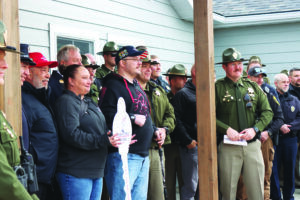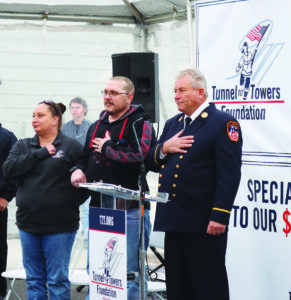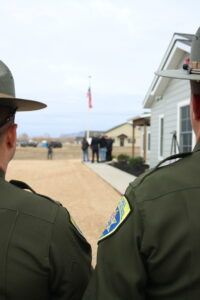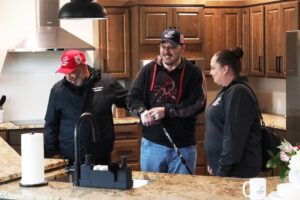
by John Dowd
There are many things that make a hero. With modern action movies, we often recognize things like capes and superpowers as a sign of heroic potential. However, it could be argued that heroism is taking action without any power at all. Often, the greatest heroes are the ones that cannot fly, do not have super strength and are not bulletproof, yet they act anyway. Wade Palmer is one such hero.
On March 15, 2019, Montana Highway Patrol Trooper Wade Palmer was ambushed by a murder suspect while responding to a call. In the confrontation, he was shot multiple times, getting struck in the neck, face and head. He luckily survived, but was left with a traumatic brain injury, speech impairment and irreparable damage to the mobility on his right side. He was medically retired after a highly decorated career and lives with his wife Lindsey Palmer and their children in Stevensville.
Last Thursday, at 1 p.m., Wade was recognized in a big way for the sacrifices he has made. Brought by a huge escort of nearly 50 members of law enforcement from across the state, Wade and his family finally got to see their state-of-the-art new home. The project has been in the works for months, and the organization responsible says they take the sacrifices first responders make every day very seriously.


The Tunnel to Towers Foundation was created in the wake of 9/11, by the siblings of a firefighter who died during the attack. Stephen Siller had just finished his shift with the Brooklyn Fire Department. He was on his way home to play golf with his siblings, when he overheard the scanner report that a plane had just struck the North Tower of the World Trade Center. He returned to the station to retrieve his gear and then headed out to join his squad who were already on their way to the tower. When he came to the tunnel to cross over to the island, security had blocked it off. He donned his over 60 pounds of gear and ran several miles across the tunnel and caught up with his squad to join them. The entire team perished when the building fell.
According to Trevor Tamsen, associate director of media relations for Tunnel to Towers, Siller’s siblings thought it was “better to cast a light than to curse the darkness,” so they started the nonprofit to help first responders across the country.
Among the many things they do, the charity builds homes all over the country for veterans and first responders who have been catastrophically injured. They have been operating for 23 years and do over 200 homes per year, between three different programs. These include paying off mortgages and building new “smart” homes, like the one in Stevensville.
Tamsen said they are often called about, or find, first responders who have been injured, or who have seen hardship, through their various connections across the U.S. Once they learn of someone, they will reach out to them, or the family, and say something like, “I know you’re grieving, but you’ll never have to pay another mortgage payment.” As Tamsen explained, “We want to take care of their loved ones like they took care of us.”
Tunnel to Towers is also committed to veterans, and as Tamsen described, “not letting them fall through the cracks.” He spoke on their new vet program, where they are buying up hotels around the country and turning them into “veteran villages,” comprised of apartment spaces. In these buildings, veterans will live alongside other veterans in similar life circumstances, and will be able to receive help.
To do all this, the organization fundraises and asks donors for $11 per month. The money they receive comes from all over the country, and from several generous corporate donors. This allows the organization to construct very expensive “smart homes,” like the one built for Wade and his family.

These buildings are built where the family lives and are designed with the responder’s specific needs in mind. In Wade’s case, there are no obstacles, no front door threshold and rooms are built to be open spaces to allow him easier mobility. The house also includes motorized doors, keyless coded entry, and a remotely controlled security, sound and temperature system which is accessible anywhere in the home. The kitchen has an oven that raises and lowers, a waist high microwave and everything is designed with easy access in mind. According to Tamsen, the bathroom is especially important. “The place you need the most independence is in the bathroom, and this bathroom is state of the art,” added Tamsen.
The ceremony to give the home to the Palmer family drew nearly 100 people, from all over the community and the state. Many of these individuals were first responders themselves. According to Anthony Trombetta, the senior director of events with Tunnel to Towers, “The biggest thing we feel about these events is introducing the family to the community.” His team’s job is to reach out to the community and make connections with the area to help organize these events. They try to get everyone involved, from area and state politicians to the local American Legion groups and other first responders. It takes them about a month to plan one of these events, and they are often doing several at a time. “It’s always great to see one of these come together,” said Trombetta.
The master of ceremonies for the house unveil was John Carroll, retired Battalion Chief for the New York Fire Department. Carroll spoke of the organization, saying, “The Siller family, out of such a tragic event, wanted to make something good out of it.” He also explained how the money people donate is used, pointing at the house they were about to unveil to Wade’s family. Carroll stated that 97 cents of every dollar raised goes into the people the organization helps.
Carroll then spoke about the hero of the day. According to Carroll, Wade served eight years and earned the Medal of Honor twice. The first time he earned it was when he saved a woman from an oncoming vehicle that lost control. The second time he earned it was when he was fired upon, which resulted in his injuries.
Along with Carroll, others spoke, including former Montana Attorney General Tim Fox, who talked about the Palmer family and the challenges they have faced since the shooting in the line of duty. Fox said, “This is not a reward, but a partial fulfillment.” He was speaking about the debt Montanans, and Americans, owe to Wade and others responding first.
Another to speak was Wade’s former commanding officer, Chief Colonel Tom Butler, who said, “Good is shining brightly, today,” after speaking of the evil that struck Wade and the Montana Highway Patrol that day.
Near the end of the ceremony, after the famous Miss Montana plane flew over several times, Carroll introduced Lindsey Palmer, who spoke on Wade and his family’s behalf. She thanked everyone and said, “This house means everything to our future.”
After the ceremony, the flag was raised in front of the home, and finally, Wade and his family walked through their new home.
During the walk-through, Charlie Percia, the senior director of construction, gave the family the tour. At the end of the walk-through, during an interview with Wade and Lindsey, Lindsey said, “Everything in this home is perfectly set up for Wade.” She explained that the wide doors, and open hallways, are a huge deal for him, as moving around, either in his wheelchair or by cane, in their current home is sometimes almost impossible. Now, as Lindsey stated, he can begin “to feel comfortable in his own home.”
For more information on Tunnel to Towers, interested parties can visit the website at www.t2t.org. They can find a bio there about Wade Palmer, as well as other recipients.